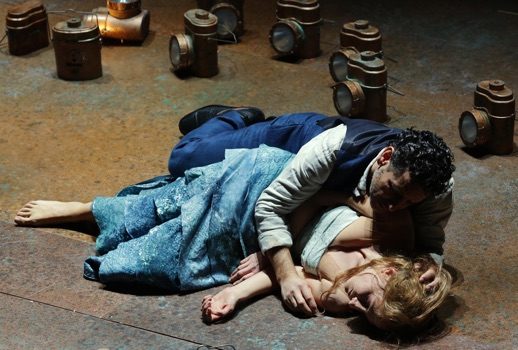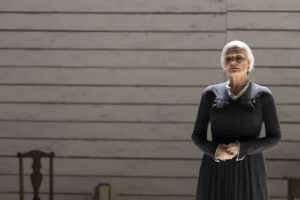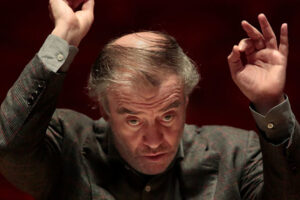

Bearing that in mind, it’s hard to imagine just what (highly repetitive) steps John Fulljames and Hofesh Schechter took to arrive at such an unmusical result in their production of Christoph Willbald Gluck’s Orphée (1774), originally from Covent Garden and currently in scena at Milan’s La Scala.
In refocusing the focus of the production on any inherent ritual in the story, as the program notes profess, Fulljames eschews the inherent exultation of the musical act. Gluck’s music swings back and forth between dance, arias, and duets, all of contrasting emotional nature, because the opera is about what music can do.
Skimping on much meaningful personenregie and sticking the orchestra not only onstage, but on a stage elevator that spent much of the show just moving up and down, Gluck’s eloquent and wide-ranging palette of emotion expressed through music seemed often incidental to the staging, a hard feat to achieve for a production with so much choreography.
Imposing such a grim sense of ceremony to the proceedings tethered the work’s winged nature and though the production raises some interesting questions, especially with a provocative change to the story’s ending, I couldn’t help but think that Gluck’s sparkling opera is not the right vehicle through which to ask them.
The blending of music, dance, and chorus are the hallmark of Gluck’s 1762 azione teatrale, with dance passaged expanded along with adaptation of the vocal line for the haute contre, high tenors, of Paris in 1774 (Patrick Mack has made my job easy by summarizing the many iterations of Gluck’s opera in his review of the same piece from LA Opera.)
Singing this version for the first time since 2015, Juan Diego Flórez seemed, if not downright perfunctory, at least a little subdued. Maybe the haute contre fach is intrinsically limited in vocal colorings to be deployed or maybe it was the limited character development, but Flórez didn’t affect much more than mildly brooding in his assumption of the title role.
His singing was consistently clean throughout the evening, even reaching a climax of frantic urgency towards the end of “J’ai perdu mon Eurydice,” but not especially compelling as his nasal, resonant voice failed to revel in Pierre-Louis Moline’s text or persuade about any god-given musical talent. If you want a believable depiction of somebody motivated to action by grief, Three Billboards Outside of Ebbing, Missouri has about the same run time.
But all this trouble had to go for something, and Christiane Karg made a very poised Eurydice, petulant and fleet of voice if not especially alluring. Her clear soprano is small but lithe and projected easily into the house. It should also be said that the changing position of the orchestra pit and the “set” (one large, perforated wall) posed an ever-evolving set of acoustic challenges to the performers, and she bore the brunt of that.
The night’s biggest revelation was not about the power of music or any meditation on love or impulse, though; it was Fatma Said as Amor. I first encountered this jewel of as a bewitching Pamina on a DVD of La Scala’s production of Zauberflöte last year. Done up in a gold suit and biting into the music with flair, Said’s Amor was a sexy gamekeeper instead of bow-wielding cherub. Her rich but agile voice, full of colors and overtones not unlike Sondra Radvanovsky’s but with more polish, was a pleasure to listen to and represents a real boon for the theater’s Academy.
Michele Mariotti, a house favorite, led a mostly expansive reading of a work that especially benefits from a crisp, incisive reading. The La Scala Orchestra and Chorus responded accordingly, though the Chorus wasn’t given much to do other than stand around. This generous reading, though, matched Schechter’s derivative, folkloric choreography. Schechter is known to New York audiences for his work on the Danny Burstein-led revival of Fiddler on the Roof in 2015. Suffice it to say that there is enough Tevye-like arm waving in his Orphée to fill several Anatevkas.
Conor Murphy’s set is simple and allows for some striking lighting effects (designed by Lee Curran) and his costumes unobtrusive if not cohesive or distinguishing between the realms through which Orpheus passes.
La Scala’s presentation of Orphée is admirable for its genre experimentation. Gluck’s piece is endlessly adaptable in how its elements can be arranged and rearranged within the opera itelf. However, I was especially disappointed to be missing their production of another opera about two lovers in hell, this one a theater staple, which goes up next month: Zandonai’s Francesca da Rimini.























Comments